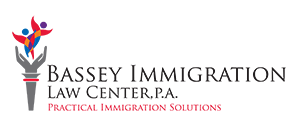What is The Fastest Way to Get U.S. Citizenship?
The fastest way to gain U.S. citizenship is by marrying a U.S. Citizen and having your spouse file for your I-130 and I-485 for your permanent residency or by joining the military. Eligible service members can file Form N-400 after one day of service. However, it is always wise to work with skilled immigration lawyers who can guide you on the quickest path to naturalization.
A citizenship attorney at Bassey Immigration Law Center will help you navigate the often complicated U.S. naturalization process while determining the fastest way to obtain citizenship. Trust our experienced and skilled team when it comes to the United States Citizenship and Immigration Services (USCIS) naturalization laws.
Fast Track Options
Naturalization Through Marriage
The fastest path to U.S. citizenship for many individuals is through marriage to a U.S. citizen. However, marriage alone is insufficient—you must provide convincing documentation that the relationship is legitimate and not entered solely for immigration purposes. In addition to your marriage certificate, this may include joint bank account statements, shared loan or mortgage documents, joint property titles, tax returns filed together, and evidence of living at the same address.
To qualify for naturalization under the three-year rule, you must be a lawful permanent resident (green card holder) and have lived in a marital union with your U.S. citizen spouse for at least three years immediately preceding the application. During that time, you must also have been physically present in the United States for at least 18 months.
In addition to physical presence, applicants must demonstrate continuous residence—meaning you maintained a primary dwelling in the United States for at least three years if applying through marriage or five years if applying independently. You must also have resided for a minimum of three months in the state or USCIS district where you intend to file.
A continuous residence period may be considered broken if you are absent from the United States for more than 180 days but less than one year unless you can provide evidence to overcome this presumption. Absences of one year or more generally break continuous residence. However, exceptions may apply for certain U.S. military members and for spouses of U.S. citizens employed abroad by the U.S. government or qualifying international organizations.
Naturalization Through Military Service
After serving honorably in the U.S. military for at least one year, you may be eligible to apply for naturalization under Section 328 of the Immigration and Nationality Act. At the time of your naturalization interview, you must either be a lawful permanent resident (green card holder) or physically present in the United States, American Samoa, Swains Island, or a U.S. military installation abroad.
If you served during a designated period of hostilities, such as after September 11, 2001, you may apply for naturalization under Section 329 without meeting the usual continuous residence or physical presence requirements.
Additionally, the surviving spouse of a U.S. citizen who died during honorable active-duty service in the U.S. Armed Forces may be eligible to apply for naturalization without meeting standard residency or physical presence criteria, provided they meet all other eligibility requirements.
Employment-Based Green Card
While not the fastest path to U.S. citizenship, naturalization through an employment-based green card is one of the most common routes for immigrants. To qualify, you must be a lawful permanent resident for at least five years before applying for naturalization using Form N-400. USCIS allows you to submit Form N-400 up to 90 days before you reach the five-year residency requirement, provided all other eligibility criteria are met.
The timeline for obtaining an employment-based green card varies depending on several factors, including:
- The type of employment-based visa category (e.g., EB-1, EB-2, EB-3)
- Per-country visa limits and backlogs, particularly for applicants from high-demand countries such as India or China
- Whether the applicant uses premium processing (available only for certain stages, such as the I-140 petition)
Each stage of the green card process must be completed before the five-year permanent residency period begins, so delays early in the process can significantly affect your overall path to citizenship.
Green Card Through Family
Family members of U.S. citizens and lawful permanent residents may be eligible to apply for a green card through family-based preference categories, which are determined by the nature of the relationship to the sponsoring relative.
These categories are processed in the following order of preference:
- First Preference (F1): Unmarried sons and daughters (age 21 or older) of U.S. citizens.
- Second Preference (F2A & F2B): F2A: Spouses and unmarried children (under age 21) of lawful permanent residents. F2B: Unmarried sons and daughters (age 21 or older) of lawful permanent residents
- Third Preference (F3): Married sons and daughters of U.S. citizens
- Fourth Preference (F4): Siblings of U.S. citizens, where the sponsoring citizen is at least 21 years old
These categories are distinct from immediate relatives of U.S. citizens—such as spouses, unmarried children under 21, and parents—who are not subject to annual caps and usually face shorter wait times.
Processing times for family-based green cards vary widely and can range from several months to many years, depending on the category, country of origin, and visa backlog. An experienced immigration attorney can assess your eligibility and help determine the most efficient path to lawful permanent residence and, ultimately, U.S. citizenship.
Based on your circumstances, trust that a deportation lawyer at Bassey Immigration Law Center can determine the fastest way for you to obtain U.S. citizenship.
Consult with an Immigration Attorney
Applying for U.S. citizenship on your own is possible, but it is not advisable. Our team of skilled immigration lawyers can review your history and immigration status and discuss the fastest way to proceed with naturalization before submitting your application.
An improperly filled-out form or a missing document could add months or years to the naturalization process. We ensure all your forms are filled out correctly and the proper documentation is submitted in a timely manner.
What are the Eligibility Requirements to Become a U.S. Citizen?
To become a U.S. citizen, you must meet eligibility requirements. These include:
- A minimum of 18 years of age
- Permanent resident (Green Card) status
- At least five years of U.S. residency
- Good moral character
- Knowledge of English and Civics
- Attached to the principles of the Constitution of the U.S.
However, some circumstances make people ineligible for U.S. citizenship. For example, anyone with a pending removal proceeding is ineligible for naturalization. A criminal record involving murder or any aggravated felony is also a bar to naturalization.
Application Form N-400
All applicants for U.S. citizenship must file Form N-400, the Application for Naturalization, and pay applicable fees. You can create an account and file your N-400 online, which allows you to receive case status alerts, send secure messages, and see all case correspondence.
All applications for U.S. citizenship must go through a naturalization interview with a USCIS officer and take two tests. The interview involves questions regarding your application and background. It is vital to tell the complete truth during the interview. If an applicant lies during the interview, their U.S. citizenship could be revoked.
The USCIS officer also determines whether additional documentation is necessary; naturalization cannot proceed until those documents are filed. The tests consist of English and Civics so that you understand the basics of American government and history. If you fail one or both tests, the USCIS permits you to reschedule for a second try within 60 to 90 days.
Your lawyer helps you prepare for the naturalization interview. We will review your Form N-400 application to ensure you answer questions correctly. Common errors include inaccurate information regarding residence addresses and dates or not listing the correct dates for employment.
Contact Bassey Immigration Law Center for a Consultation
To gain U.S. citizenship, contact the U.S. citizenship attorneys at Bassey Law and learn the steps you must take to become a citizen. Our compassionate and multi-lingual staff have over two decades of experience helping people through the system. We have worked with clients from Central or South America, Europe, Asia, the Middle East, Australia, Africa, and other countries around the globe. We know how to fight for your future. Book an affordable consultation today.
About Bassey Immigration Law Center, P.A.
Bassey Immigration Law Center, P.A., led by attorney Aniefiok Bassey, provides comprehensive immigration services to individuals, families, and businesses in Florida and beyond. With over 20 years of experience, the firm assists clients with a wide range of immigration matters, from family reunification and green cards to business visas and deportation defense. The diverse, multilingual team is dedicated to supporting clients through the complex immigration process, with a special focus on citizenship, asylum, and LGBTQ+ immigration needs. They offer affordable initial consultations and are committed to delivering personalized, strategic guidance for achieving clients’ immigration goals.
\


